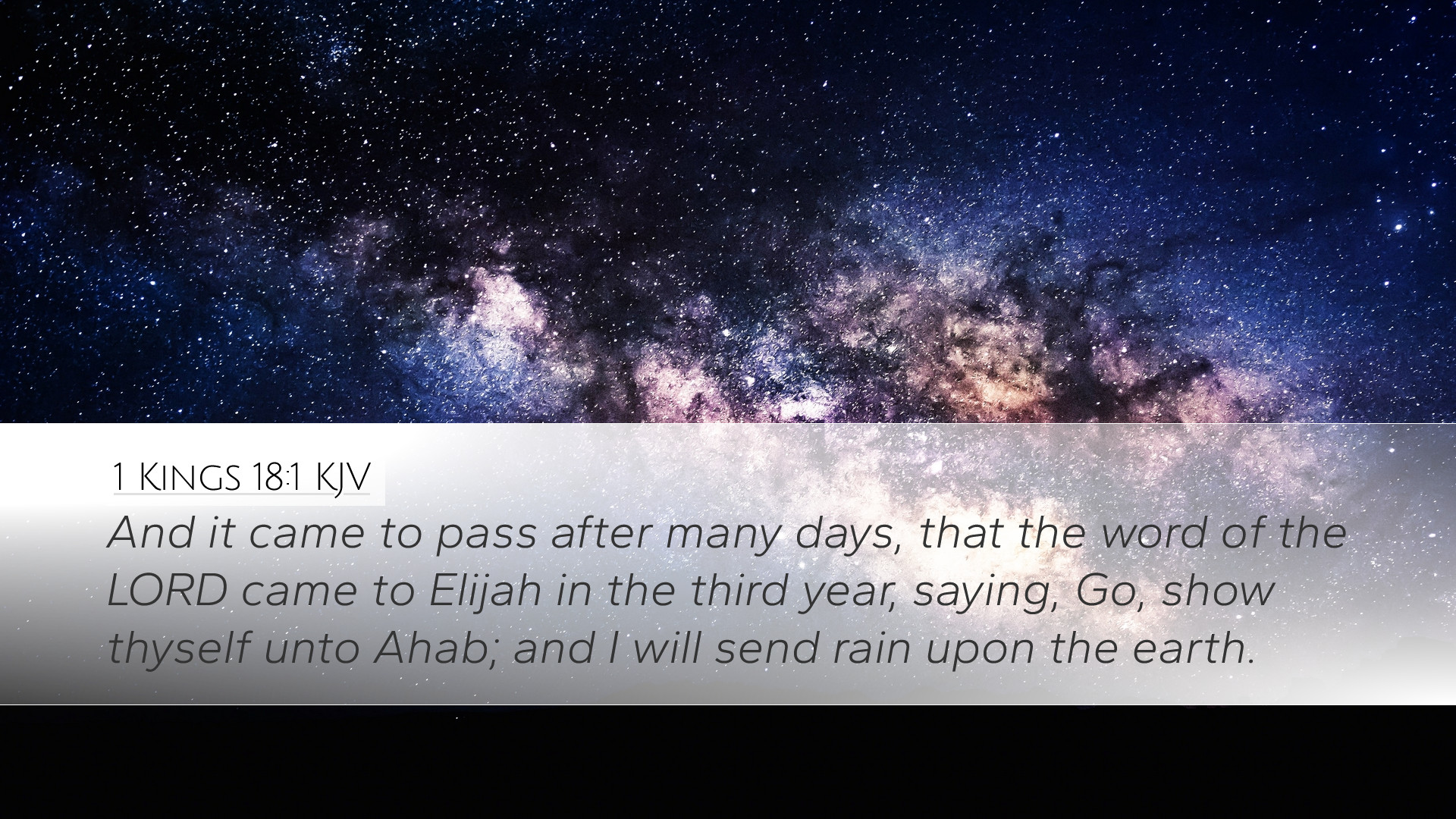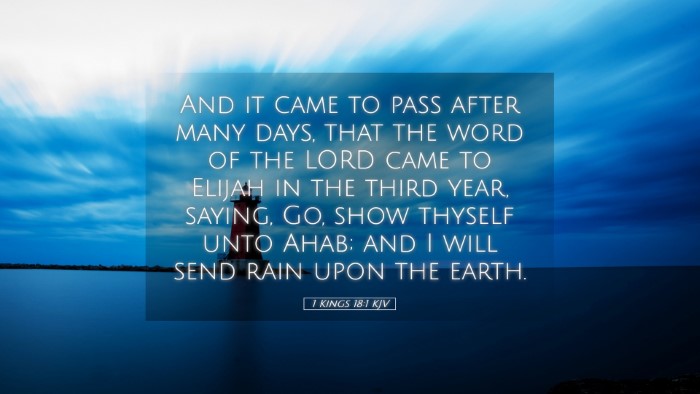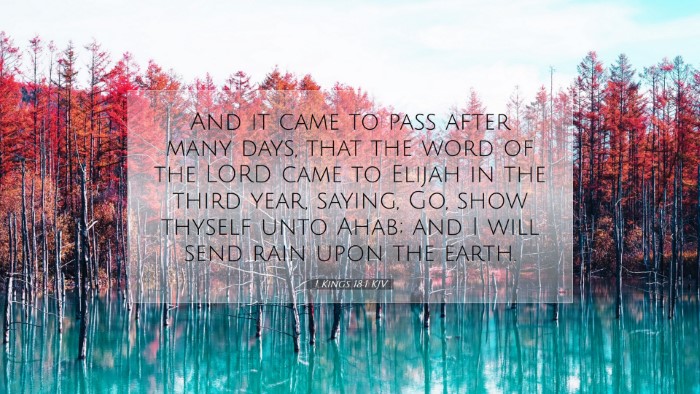Commentary on 1 Kings 18:1
Biblical Context: The context of 1 Kings 18:1 is significant as it occurs during a pivotal moment in Israel's history. The northern kingdom of Israel is plagued by idolatry and the worship of Baal, largely promoted by King Ahab and his wife, Jezebel. In stark contrast, the prophet Elijah emerges as a critical figure tasked with bringing the nation back to the worship of Yahweh.
Verse (1 Kings 18:1): "And it came to pass after many days, that the word of the Lord came to Elijah in the third year, saying, 'Go, show yourself unto Ahab; and I will send rain upon the earth.'
Summary of Commentaries
1. Matthew Henry's Commentary
Matthew Henry emphasizes the sovereignty and mercy of God in this passage. He notes that the phrase, "after many days," signals a period of judgment upon Israel due to their unfaithfulness. The drought, which lasted three years, was a prophetic sign of the people's need for repentance (Henry, 1 Kings 18).
Moreover, God’s command to Elijah to "show yourself unto Ahab" reflects the divine plan to confront the king and the wickedness that had led Israel astray. Henry points out the grace that God exhibits; despite their rebellion, He is ready to restore both the land and the people. God promises to send rain, signifying both physical sustenance and spiritual renewal.
2. Albert Barnes' Notes on the Bible
Albert Barnes provides a detailed exposition of the critical themes present in 1 Kings 18:1. He highlights the timing of God's Word coming to Elijah after three years and frames it within the historical context of the drought as a consequence of Israel's sins. Barnes argues that God's timing is meticulous and perfect, demonstrating His ultimate control over creation.
He further analyzes the command given to Elijah, noting it as both a challenge and an opportunity for public testimony against Ahab’s tyrannical regime. By confronting Ahab, Elijah was not only revealing the true God but also calling the king to face the consequences of his idolatry. Additionally, Barnes draws a parallel between physical drought and spiritual barrenness, suggesting that the coming rain symbolizes God’s grace and the restoration of a covenant relationship with His people.
3. Adam Clarke's Commentary
Adam Clarke's analysis of 1 Kings 18:1 delves into the prophetic significance of Elijah's ministry during a time of crisis for Israel. Clarke notes that the phrase "the word of the Lord came" indicates a profound communication from God, underscoring the importance of divine revelation in guiding the prophet.
Clarke highlights the theological implications of God's command to Elijah to reveal himself to Ahab. He posits that Elijah’s mission was not just about confronting Ahab but also restoring hope to the Israelite people by demonstrating God’s willingness to forgive and bless them once more. The promise of rain is a central theme in Clarke’s interpretation, representing God's covenant faithfulness despite the people's failures.
Theological Insights
Several theological themes emerge from 1 Kings 18:1 that are impactful for pastoral and scholarly reflection:
- The Sovereignty of God: The verse emphasizes God's complete authority over the natural world. It serves as a reminder that even when circumstances appear dire, God is still at work behind the scenes.
- Repentance and Restoration: The call for Elijah to confront Ahab signifies the need for repentance among the Israelites. It reveals that even in times of judgment, God provides a path to restoration.
- The Role of Prophetic Ministry: Elijah’s obedience and willingness to engage with Ahab and the people of Israel demonstrate the crucial role of prophets as messengers of God’s word and truth.
- Hope in Despair: The promise of rain serves as a metaphor for hope, showcasing God's grace, which revitalizes both the land and the spirit of the people.
Application for Today
For pastors, students, and theologians, 1 Kings 18:1 provides an ample source for reflection and application in contemporary contexts:
- Encouragement in Ministry: Just as God directed Elijah, believers are reminded of their calling to confront sin in their communities and share the message of hope and reconciliation.
- Faithfulness in Adversity: Elijah's faithfulness despite the challenges of the drought encourages believers to remain steadfast in their faith, even in dry seasons of spirituality.
- God's Promise of Restoration: This verse teaches that God desires restoration for His people, encouraging churches to seek renewal and revival in their congregations.
- Awareness of Influence: Leaders and church members alike must be aware of their influence on others and strive to promote faithfulness to God, steering clear of the distractions of culture and idolatry.
Conclusion
The insights drawn from 1 Kings 18:1 remind us of the intricate relationship between divine sovereignty, judgment, and grace. As Elijah’s story unfolds, it becomes imperative for readers to recognize not only God’s power over nature and leadership but also His readiness to extend grace to those in need of renewal. This call to repentance and hope is as relevant today as it was in ancient Israel, making this verse a timeless source of inspiration and instruction.


